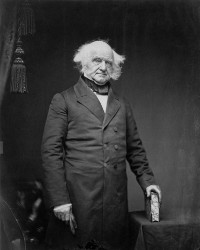Articles
Bureaucracy and the Civil Service in the United States, by
Murray N. Rothbard,
The Journal of Libertarian Studies, 1995
Historical examination of the evolution of the United States Civil Service and attempts to reform it, from its beginnings through the early 20th century
[Martin] Van Buren, the brilliant political tactician who had been inspired by a weekend with Jefferson at Monticello in May 1824 to spend his life forming a new political party — later to be the Democratic Party — dedicated to taking back America for the old cause, for the libertarian Old Republican ideals of 1776 and 1798 ... Van Buren, his successor and an ardent Jacksonian, had little reason to remove Jacksonian officials. In his last two years in office, he removed 364 postmasters, amounting to about three percent of 12,000, to tighten the officialdom a bit for the coming election campaign.
Related Topics:
John Adams,
Bureaucracy,
Founding Fathers,
Government,
Limited Government,
Ulysses S. Grant,
Andrew Jackson,
Thomas Jefferson,
Andrew Johnson,
Richard Nixon,
Parkinson's Law,
Pennsylvania,
Political Parties,
Spoils System,
Voting,
George Washington
Martin Van Buren: The American Gladstone, by
Jeffrey Rogers Hummel,
Reassessing the Presidency, 2001
Revised version of the 1999 essay "Martin Van Buren: The Greatest American President", now a chapter in
Reassessing the Presidency: The Rise of the Executive State and the Decline of Freedom (2001)
On top of his sincere desire for friendly relations with all foreign powers, Van Buren correctly foresaw that territorial expansion might split Democratic ranks. He therefore deftly rebuffed Texas overtures, and Secretary of State John Forsyth of Georgia announced on August 25, 1837, formal rejection of the offer of annexation ... President Van Buren also could have had a war over Canada ... The president responded to the crisis by issuing two strong proclamations of neutrality, by calling out the militias of New York and Vermont to enforce the proclamations, and by sending General Winfield Scott on a mediatory mission.
Martin Van Buren: The Greatest American President [PDF], by
Jeffrey Rogers Hummel,
The Independent Review, 1999
Discusses the Van Buren presidency and why he should be considered "the greatest president in American history", even when compared to other nonactivist presidents
Born of humble Dutch ancestry in December 1782 in the small, upstate New York village of Kinderhook, Van Buren gained admittance to the bar in 1803 without benefit of higher education ... Van Buren succeeded to the presidency as Old Hickory's heir apparent on March 4, 1837, but this ... lustrous career would prove short-lived ... [A] close examination of Van Buren's four years in office reveals that historians have grossly underrated his many remarkable accomplishments in the face of heavy odds. Those accomplishments, in my opinion, rank [him] as the greatest president in American history.

